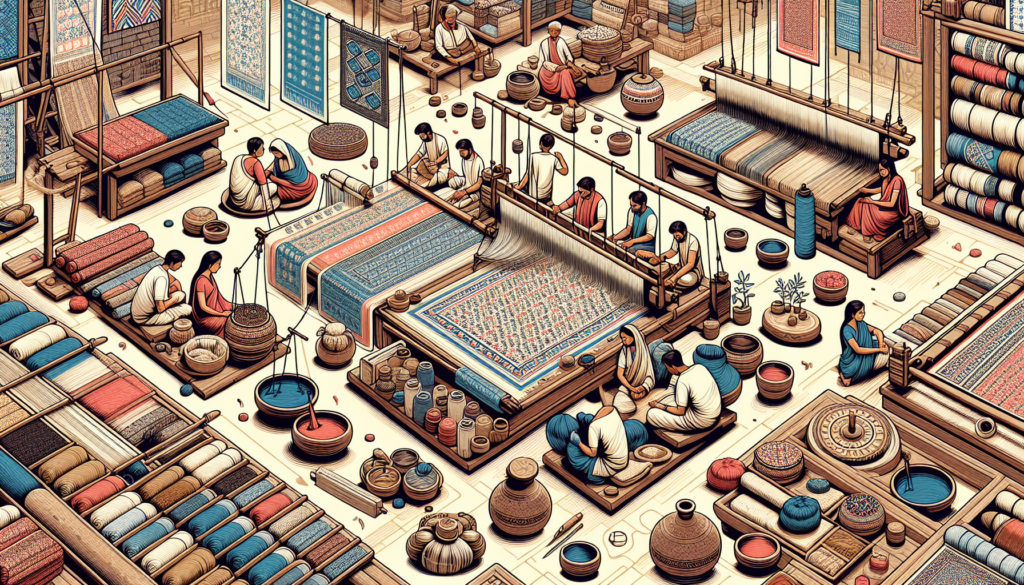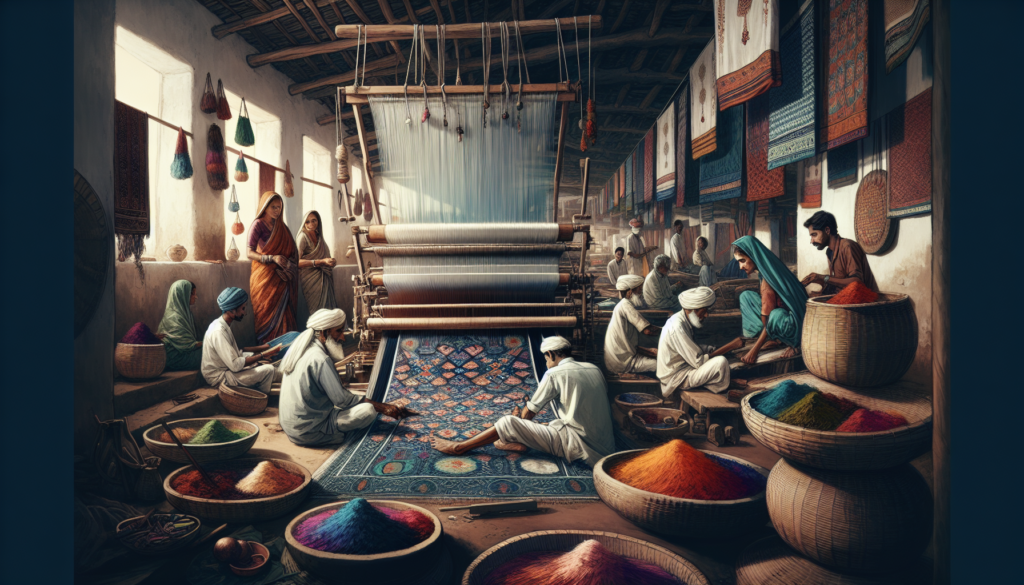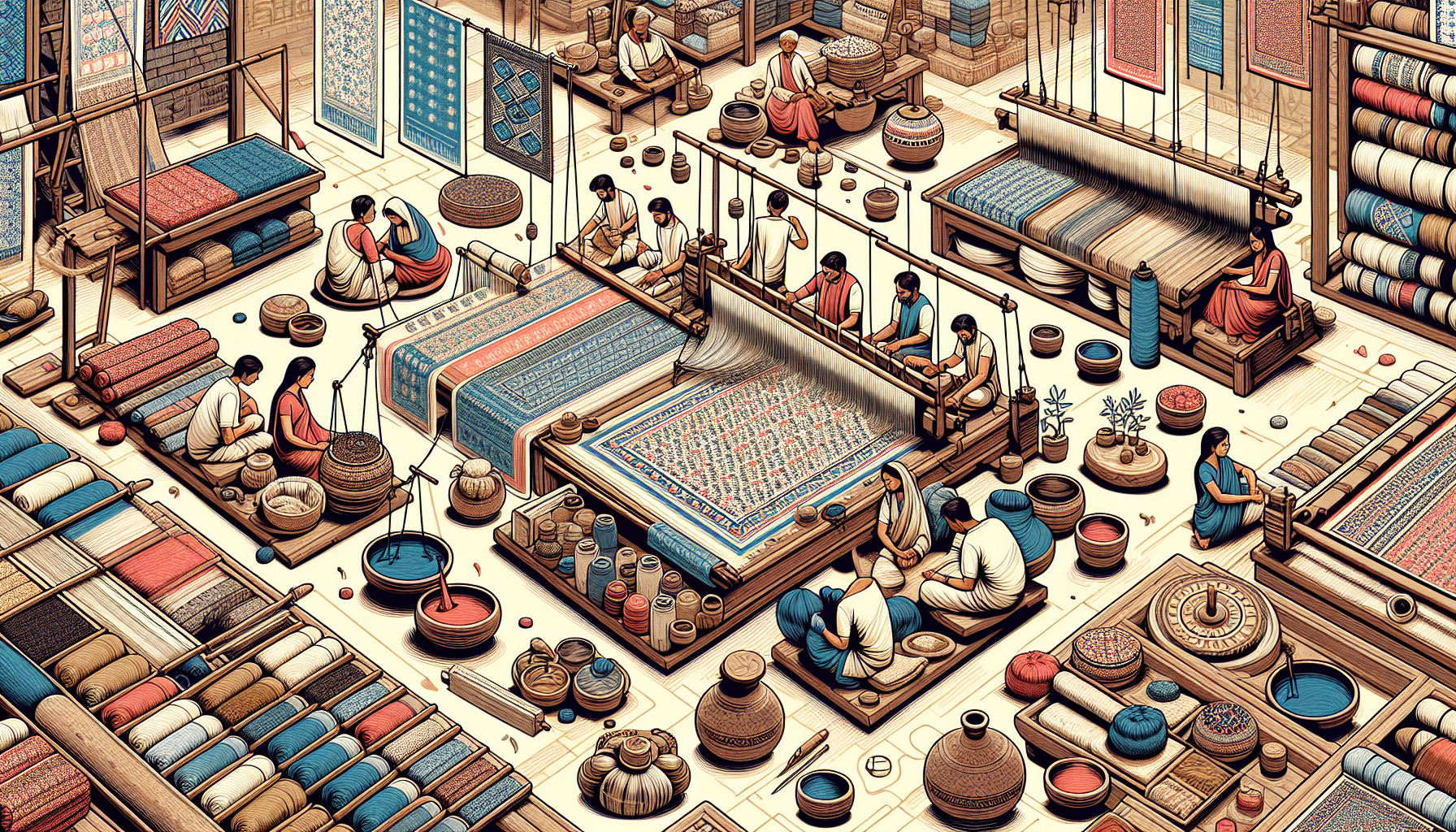Curious about how sustainable and ethical practices are being implemented in the Indian rug production industry? Wondering if there are any companies that can help meet your needs for Indian home furnishings? Look no further! In this informative blog post, we will explore the various sustainable and ethical practices that are being adopted in Indian rug production. Whether you’re a conscious consumer or a business looking to source ethically-made rugs, this article will provide you with all the information you need. Keep reading to discover how Sheeltex India can assist you in fulfilling your Indian home furnishing requirements.

Environmental sustainability
In recent years, there has been a growing awareness of the need for environmental sustainability in the rug production industry. Manufacturers are increasingly turning to the use of natural and biodegradable materials in their production processes. This not only reduces the carbon footprint of the industry but also helps to minimize the environmental impact of the rugs themselves. By utilizing materials such as organic cotton, jute, and bamboo, manufacturers are able to create rugs that are not only beautiful but also eco-friendly. These natural materials are renewable resources and have a significantly lower environmental impact compared to synthetic materials.
Another important aspect of environmental sustainability in rug production is the implementation of water conservation measures. Manufacturers are adopting techniques that minimize water usage and ensure proper wastewater treatment. By using recycling systems and implementing efficient processes, water consumption in rug production is being reduced. This not only helps to conserve this valuable resource but also prevents water pollution.
In addition to using natural materials and conserving water, the rug production industry is also adopting eco-friendly dyeing techniques. Traditional dyeing processes often involve the use of toxic chemicals that can harm the environment and pose health risks to workers. However, manufacturers are now turning to natural dyes and non-toxic alternatives. These dyes are made from plant extracts and mineral pigments, making them safer for the environment and the artisans who work with them. By promoting the use of eco-friendly dyeing techniques, the industry is taking a significant step towards achieving a more sustainable future.
Furthermore, the promotion of reforestation efforts is another important aspect of environmental sustainability in rug production. Many rug manufacturers are actively involved in reforestation projects to offset their carbon emissions and restore natural habitats. By planting trees and supporting forestry initiatives, these manufacturers are not only helping to combat deforestation but also contributing to the overall health of the planet. Reforestation efforts are crucial in maintaining biodiversity, conserving water, and mitigating climate change. By prioritizing reforestation, the rug production industry is working towards a more sustainable and greener future.
Fair trade and labor practices
Ensuring fair trade and labor practices is of utmost importance in the rug production industry. Manufacturers are taking steps to ensure that workers are paid fair wages and are provided with safe and humane working conditions. By collaborating with industry associations and international labor organizations, manufacturers are establishing ethical standards and guidelines that promote fair trade and protect the rights of workers.
One specific aspect of fair trade and labor practices in the rug production industry is the prohibition of child labor. Manufacturers are taking a strong stance against child labor by implementing strict policies that prohibit the employment of children in rug production. By adhering to these policies and supporting initiatives that combat child labor, manufacturers are demonstrating their commitment to social responsibility and the well-being of children.
Moreover, the rug production industry is empowering and supporting local artisans by providing them with fair opportunities and training. By working directly with artisans and investing in their skills development, manufacturers are not only promoting traditional craftsmanship but also fostering economic growth in local communities. This approach helps to create sustainable livelihoods and reduce economic disparities.
Another important aspect of fair trade and labor practices in the rug production industry is promoting gender equality. By providing equal employment opportunities and supporting women artisans, manufacturers are contributing to the empowerment of women in the industry. This includes initiatives such as training programs, leadership development, and promoting equal pay for equal work. By promoting gender equality, the rug production industry is not only creating a more inclusive and diverse workforce but also driving positive social change.
Implementation of responsible sourcing
Responsible sourcing is a key component of sustainable and ethical rug production. Manufacturers are increasingly focusing on the traceability of raw materials to ensure that they are sourced from sustainable and ethical origins. This includes working with suppliers who adhere to responsible and sustainable farming practices. By engaging with local communities and suppliers, manufacturers can form partnerships that incorporate social and environmental considerations into the sourcing process.
Reducing the carbon footprint in transportation is another important aspect of responsible sourcing. Manufacturers are exploring ways to minimize the environmental impact of transporting raw materials and finished rugs. This includes optimizing transportation routes, using more fuel-efficient vehicles, and exploring alternative transportation methods such as rail and sea. By reducing carbon emissions in transportation, manufacturers are working towards a more sustainable and climate-friendly industry.
Development of social initiatives
The rug production industry is actively involved in the development of social initiatives. Manufacturers are investing in education and skills training programs to empower and uplift local communities. By providing access to education and training, manufacturers are helping individuals acquire valuable skills that can lead to better employment opportunities and improved livelihoods.
Supporting community development projects is another crucial aspect of social initiatives in the rug production industry. Manufacturers are recognizing the importance of giving back to the communities in which they operate. This includes supporting initiatives such as building schools, healthcare facilities, and other infrastructure projects that contribute to the overall well-being of the community.
In addition to education and community development, the rug production industry is also providing healthcare and social security benefits to its workers. By prioritizing the health and safety of workers, manufacturers are creating a work environment that promotes well-being and ensures that employees are protected. This includes access to healthcare facilities, health insurance, and other social security benefits.
Promoting cultural preservation and diversity is another important aspect of social initiatives in the rug production industry. Many manufacturers are working towards preserving traditional craftsmanship and indigenous designs. By supporting artisans and incorporating cultural elements into their products, manufacturers are promoting diversity and preserving cultural heritage.

Quality certifications and standards
Adhering to internationally recognized certifications and ethical standards is a cornerstone of the rug production industry’s commitment to sustainability and ethical practices. By obtaining certifications such as Fair Trade, Global Organic Textile Standard (GOTS), and Forest Stewardship Council (FSC), manufacturers are providing assurance to consumers that their products meet specific environmental and social criteria.
Compliance with ethical standards for production is another important aspect of ensuring responsible and ethical practices in the rug production industry. This includes adhering to labor standards, ensuring safe working conditions, and respecting the rights of workers. Manufacturers are actively monitoring and auditing their production processes to ensure compliance with these standards.
Ensuring product safety and non-toxicity is another key focus of the rug production industry. Manufacturers are committed to producing rugs that are safe for consumers and the environment. By using non-toxic materials and implementing quality control measures, manufacturers are providing consumers with products that meet the highest safety standards.
Transparency in the supply chain and production processes is crucial for maintaining trust and accountability. Manufacturers are increasingly adopting transparency measures, such as providing information on the origin of materials, production methods, and certifications. By offering transparency, manufacturers enable consumers to make informed choices and support ethical and sustainable rug production.
Innovation and technology
Innovation and technology play a vital role in achieving sustainability and ethical practices in the rug production industry. Manufacturers are implementing energy-efficient manufacturing processes to reduce the industry’s carbon footprint. This includes investing in technologies that optimize energy usage, minimize waste, and increase production efficiency.
The utilization of sustainable packaging materials is another important aspect of innovation in the rug production industry. Manufacturers are exploring alternatives to traditional packaging materials, such as biodegradable and recyclable options. By using sustainable packaging, manufacturers can further reduce the environmental impact of their products.
The exploration of alternative and renewable energy sources is also a key area of focus in the rug production industry. Manufacturers are investing in technologies such as solar and wind power to reduce reliance on fossil fuels and minimize greenhouse gas emissions. By embracing alternative energy sources, manufacturers can contribute to a more sustainable and clean energy future.
Integration of digital solutions for efficiency and transparency is another aspect of innovation in the rug production industry. Manufacturers are leveraging digital technologies to streamline production processes, improve supply chain management, and enhance transparency. This includes implementing software systems for inventory management, tracking product origins, and monitoring production stages. By integrating digital solutions, manufacturers can improve efficiency, reduce waste, and provide consumers with real-time information about the products they purchase.
Customer awareness and education
Educating consumers about sustainable and ethical choices is crucial for driving change in the rug production industry. Manufacturers are actively engaging with consumers to raise awareness about the importance of sustainability and ethics. This includes providing information through various channels such as websites, social media, and product packaging.
Providing information on product origins and production methods is another important aspect of customer awareness and education. By sharing information about the materials used, production processes, and certifications obtained, manufacturers enable consumers to make informed decisions. This transparency fosters trust and empowers consumers to support sustainable and ethical rug production.
Encouraging responsible consumption and conscious buying is another focus of customer awareness and education in the rug production industry. Manufacturers are promoting the concept of buying less but buying better. By advocating for quality over quantity, manufacturers aim to reduce overconsumption and the environmental impact associated with fast fashion. This shift towards conscious buying encourages consumers to invest in products that are durable, sustainable, and ethically produced.
Promoting ethical fashion and home furnishings is a key objective in customer awareness and education. Manufacturers are highlighting the benefits of choosing products that align with ethical and sustainable values. By showcasing the craftsmanship, quality, and social and environmental benefits of ethically produced rugs, manufacturers can inspire consumers to make conscious choices.
Collaboration and industry partnerships
Collaboration and industry partnerships are crucial for driving sustainable and ethical practices in the rug production industry. Manufacturers are working with NGOs and organizations for sustainable development to exchange knowledge, share best practices, and implement joint initiatives. By collaborating with these organizations, manufacturers can leverage their expertise and resources to drive positive change.
Furthermore, collaborating with other rug producers is another important aspect of industry partnerships. By sharing best practices, insights, and challenges, manufacturers can collectively work towards a more sustainable and ethical industry. This collaboration enables the industry to learn from one another, innovate, and collectively address common issues.
Engagement with government and regulatory bodies is another important aspect of collaboration in the rug production industry. Manufacturers are actively participating in discussions and consultations with government and regulatory bodies to shape policies and regulations that encourage sustainable and ethical practices. By engaging with these entities, manufacturers can advocate for the adoption of supportive policies and receive guidance on best practices.
Participating in industry conferences and events is another way manufacturers collaborate and share knowledge. By attending and presenting at conferences and events, manufacturers can learn from industry experts, exchange ideas with peers, and stay updated on the latest trends and developments. This knowledge sharing contributes to the continuous improvement and growth of the industry.
Incentives and support
Incentives and support are crucial for driving sustainable and ethical practices in the rug production industry. Governments play a key role in providing incentives for manufacturers to adopt sustainable and ethical practices. This can include tax incentives, subsidies, and grants that reward manufacturers for their commitment to sustainability and ethics. By offering these incentives, governments encourage manufacturers to invest in environmentally friendly technologies, support local communities, and improve labor conditions.
Furthermore, financial support for small-scale rug producers is an important aspect of incentivizing sustainable and ethical practices. Small-scale producers often face challenges in adopting sustainable practices due to limited resources and financial constraints. By providing financial support such as low-interest loans and grants, governments and organizations can help these producers overcome barriers and transition to more sustainable and ethical production methods.
Recognition and awards for sustainable initiatives also incentivize manufacturers to embrace sustainability and ethics. By acknowledging and rewarding manufacturers for their efforts, the industry can create a competitive environment that drives continuous improvement. Awards and recognition serve as a platform to showcase best practices, inspire others, and ultimately shift the industry towards a more sustainable and ethical future.
Promoting ethical rug production through grants and subsidies is another means of providing support to manufacturers. Governments and organizations can offer financial assistance to manufacturers specifically engaged in ethical rug production. These grants and subsidies help manufacturers invest in socially responsible initiatives, such as training programs, gender equality initiatives, and community development projects.
Challenges and future prospects
While there have been significant advancements in sustainable and ethical practices in Indian rug production, there are still challenges to be addressed. One of the main challenges is the complexity of global supply chains. The rug production industry relies on a complex network of suppliers, manufacturers, and retailers. Ensuring transparency and traceability throughout the supply chain can be challenging, particularly in regions where regulations and oversight may be limited. However, manufacturers are actively working to address this challenge by implementing robust traceability systems and engaging with suppliers who adhere to ethical and sustainable practices.
Implementing sustainable practices on a larger scale is another challenge that the rug production industry faces. While many manufacturers have made significant progress in adopting sustainable practices, scaling these practices across the entire industry requires a collective effort. This includes raising awareness, providing support and resources, and fostering collaboration among manufacturers, suppliers, and other stakeholders. By working together, the industry can overcome this challenge and achieve widespread sustainability.
Balancing economic viability with ethical considerations is a delicate task for rug producers. Sustainable and ethical practices often come with additional costs, such as investing in renewable energy sources, conducting audits and certifications, and providing fair wages and benefits to workers. It is important for manufacturers to find a balance between sustainability and profitability to ensure the long-term viability of their businesses. This requires careful planning and innovative strategies that integrate sustainability into all aspects of the production process.
Embracing technology and innovation is essential for the future growth of the rug production industry. Advancements in technology offer new opportunities to enhance sustainability and efficiency in production processes. From the utilization of artificial intelligence for inventory management to the integration of blockchain for supply chain transparency, technology can revolutionize the industry. By embracing innovation, the rug production industry can continue to evolve and meet the increasing demand for sustainable and ethical products.
In conclusion, sustainable and ethical practices are being adopted in Indian rug production to minimize environmental impact, promote fair trade and labor practices, ensure responsible sourcing, develop social initiatives, adhere to quality certifications and standards, embrace innovation and technology, educate customers, foster collaboration, provide incentives and support, and address challenges for a sustainable future. By integrating these practices, the rug production industry is working towards a more sustainable, ethical, and environmentally responsible future.


